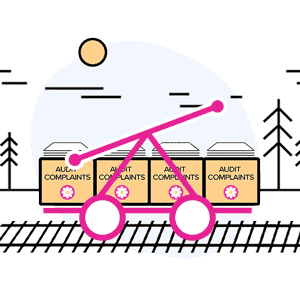Employers Beware: LWP Is a Bad Look

Most California self-insured employers utilize a Third-Party Administrator (TPA) to handle injured workers’ claims on their behalf. But not all TPAs are equally competent in complying with state laws and regulations and ensuring that doctors are properly reimbursed for treating injured workers.
In other words, some TPAs misrepresent their workers’ comp clients.
When TPAs fail, it worsens the already serious crisis of doctors fleeing the system because workers’ comp is seen as financially unsustainable for practices. As a result, injured employees find it harder and harder to get the care they need, making it a genuine disservice to workers for employers to hire the wrong TPA.
For an example, look no further than TPA LWP Claims Solutions, which provides a perfect case study on why so many doctors avoid treating injured workers — and remember that taking care of the doctors who take care of your injured employees is always a prudent investment.
LWP: Non-Compliant With CA Workers’ Comp Law
As we outline in this article, LWP has failed to follow critical regulations governing how claims administrators must reimburse providers for treating injured workers. Mostly, this non-compliance results from LWP’s technical inability to receive and process electronic workers’ comp bills properly.
One of the most important ways doctors can make treating injured workers financially tenable is to bill electronically. Because of the labyrinth of regulations and ever-shifting fee schedules, the administrative burden of workers’ comp billing is heavy — but e-billing makes it much lighter, allowing doctors to treat injured workers with (far) less administrative hassle.
…that is, of course, as long as the claims administrator follows the rules regarding payment of e-bills. Based on thousands of e-bills our provider clients have submitted, we can report that LWP has an unfortunate habit of:
- Improperly rejecting valid e-bills from doctors
- Failing to respond timely or properly to e-bills
- Denying payment in ways that doctors cannot appeal
- Failing to transmit necessary revenue management data to doctors
All of the above put a strain on medical practices, who must do everything from faxing paper bills to LWP (a slow and unreliable method), to constantly appealing LWP’s denials, to filing formal complaints with the California Division of Workers’ Compensation (DWC).
In fact, daisyBill recently filed 7,112 Audit Complaints against LWP for its consistent failure to follow state payment regulations.
LWP and The TPA Role
According to its website, LWP serves various clients in addition to individual self-insured employers, including insurers and Joint Power Authorities. We can’t say how well LWP is representing these different types of clients. Still, any entity responsible for workers’ comp coverage in California should be aware of the TPA’s e-billing issues.
The LWP website also lists several components of the TPA’s “approach” to claims management:
In our experience, LWP’s approach of “transparency” does not extend to the mandated breakdowns of how LWP adjudicated providers’ e-bills. LWP’s response to these e-bills is often missing, late, or does not contain the information providers need. In some cases, LWP even uses incorrect arithmetic when calculating charges and payments.
(If LWP reports bad math to doctors, what math are they reporting to their employer clients?)
As it stands, LWP’s claims management is not “proactive” enough to ensure correct payment or legal compliance, and its “use of resources” is too “judicious” to effectively address its technical shortcomings.
Altogether, it seems that LWP could sacrifice some of its “creativity” in favor of more “discipline.”
TPAs serve an important function in workers’ comp, enabling employers to meet their obligations to their employees independently and saving revenue that would otherwise go to insurers. But when a TPA, acting as an employer’s agent, doesn’t follow the law, it’s a very bad look.
More to the point, TPAs who can’t fulfill their basic function as intermediaries between employers and health care providers put injured workers in a precarious position. For each doctor a TPA like LWP drives away, workers have one fewer place to seek care.
Employers should choose a TPA that takes their job seriously enough to do it properly.
daisyBill fights the good fight on behalf of workers’ comp providers. Reach out to see how we can help your practice obtain fast, correct reimbursement for treating injured workers.
LET’S TALK
DaisyBill provides content as an insightful service to its readers and clients. It does not offer legal advice and cannot guarantee the accuracy or suitability of its content for a particular purpose.

.png)

.gif)
.png)



